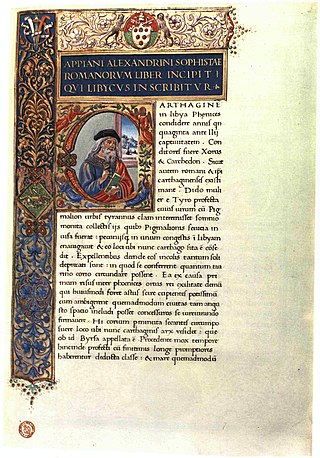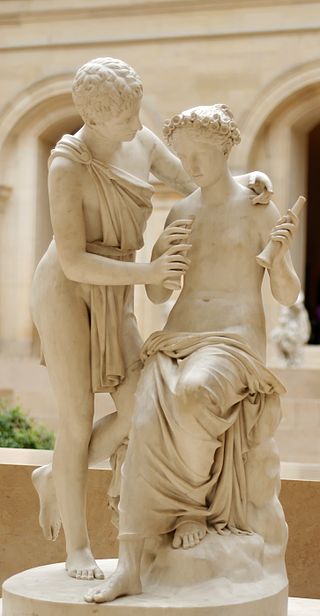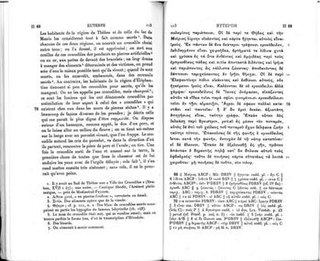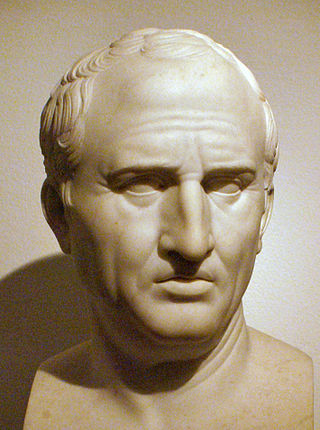Related Research Articles
Diogenes Laërtius was a biographer of the Greek philosophers. Little is definitively known about his life, but his surviving Lives and Opinions of Eminent Philosophers is a principal source for the history of ancient Greek philosophy. His reputation is controversial among scholars because he often repeats information from his sources without critically evaluating it. He also frequently focuses on trivial or insignificant details of his subjects' lives while ignoring important details of their philosophical teachings and he sometimes fails to distinguish between earlier and later teachings of specific philosophical schools. However, unlike many other ancient secondary sources, Diogenes Laërtius generally reports philosophical teachings without attempting to reinterpret or expand on them, which means his accounts are often closer to the primary sources. Due to the loss of so many of the primary sources on which Diogenes relied, his work has become the foremost surviving source on the history of Greek philosophy.
In Greek mythology, Erebus, or Erebos, is the personification of darkness. In Hesiod's Theogony, he is the offspring of Chaos, and the father of Aether and Hemera (Day) by Nyx (Night); in other Greek cosmogonies, he is the father of Aether, Eros, and Metis, or the first ruler of the gods. In genealogies given by Roman authors, he begets a large progeny of personifications upon Nox, while in an Orphic theogony he is the offspring of Chronos (Time). The name "Erebus" is also used to refer either to the darkness of the Underworld, the Underworld itself, or the region through which souls pass to reach Hades, and can sometimes be used as a synonym for Tartarus or Hades.

Robinson Ellis, FBA was an English classical scholar.
Gaius Valerius Flaccus was a 1st-century Roman poet who flourished during the "Silver Age" under the Flavian dynasty, and wrote a Latin Argonautica that owes a great deal to Apollonius of Rhodes' more famous epic.

The Deipnosophistae is an early 3rd-century AD Greek work by the Greek author Athenaeus of Naucratis. It is a long work of literary, historical, and antiquarian references set in Rome at a series of banquets held by the protagonist Publius Livius Larensis for an assembly of grammarians, lexicographers, jurists, musicians, and hangers-on.

Appian of Alexandria was a Greek historian with Roman citizenship who prospered during the reigns of Emperors of Rome Trajan, Hadrian, and Antoninus Pius.

The Harvard Classics, originally marketed as Dr. Eliot's Five-Foot Shelf of Books, is a 50-volume series of classic works of world literature, important speeches, and historical documents compiled and edited by Harvard University President Charles W. Eliot. Eliot believed that a careful reading of the series and following the eleven reading plans included in Volume 50 would offer a reader, in the comfort of the home, the benefits of a liberal education, entertainment and counsel of history's greatest creative minds. The initial success of The Harvard Classics was due, in part, to the branding offered by Eliot and Harvard University. Buyers of these sets were apparently attracted to Eliot's claims. The General Index contains upwards of 76,000 subject references.

Sextus Propertius was a Latin elegiac poet of the Augustan age. He was born around 50–45 BC in Assisium and died shortly after 15 BC.

Daphnis and Chloe is a Greek pastoral novel written during the Roman Empire, the only known work of second-century Hellenistic romance writer Longus.

Sextus Pompeius Festus, usually known simply as Festus, was a Roman grammarian who probably flourished in the later 2nd century AD, perhaps at Narbo (Narbonne) in Gaul.

Martin Litchfield West, was a British philologist and classical scholar. In recognition of his contribution to scholarship, he was awarded the Order of Merit in 2014.
Theophylact Simocatta was an early seventh-century Byzantine historiographer, arguably ranking as the last historian of Late Antiquity, writing in the time of Heraclius about the late Emperor Maurice (582–602).

The Bibliotheca Teubneriana, or Bibliotheca Scriptorum Graecorum et Romanorum Teubneriana, also known as Teubner editions of Greek and Latin texts, comprise one of the most thorough modern collections published of ancient Greco-Roman literature. The series consists of critical editions by leading scholars. They now always come with a full critical apparatus on each page, although during the nineteenth century there were editiones minores, published either without critical apparatuses or with abbreviated textual appendices, and editiones maiores, published with a full apparatus.

The Collection Budé, or the Collection des Universités de France, is an editorial collection comprising the Greek and Latin classics up to the middle of the 6th century. It is published by Les Belles Lettres, and is sponsored by the Association Guillaume Budé.
Les Belles Lettres is a French publisher specialising in the publication of ancient texts such as the Collection Budé.
Sir Peter Hugh Jefferd Lloyd-JonesFBA was a British classical scholar and Regius Professor of Greek at the University of Oxford.

The writings of Marcus Tullius Cicero constitute one of the most renowned collections of historical and philosophical work in all of classical antiquity. Cicero was a Roman politician, lawyer, orator, political theorist, philosopher, and constitutionalist who lived during the years of 106–43 BC. He held the positions of Roman senator and Roman consul (chief-magistrate) and played a critical role in the transformation of the Roman Republic into the Roman Empire. He was extant during the rule of prominent Roman politicians, such as those of Julius Caesar, Pompey, and Marc Antony. Cicero is widely considered one of Rome's greatest orators and prose stylists.
Antonio Garzya was an Italian classical scholar, philologist, and university professor.
Michael David Reeve FBA is a British classicist and professor emeritus at Cambridge University. One of the foremost textual scholars of his generation, he has published widely on the transmission of Latin and Greek texts. He served as the eighth Kennedy Professor of Latin.
Robert Howard Rodgers is an American philologist who is emeritus professor of classics at the University of Vermont. His edition of Frontinus's De Aquaeductu Urbis Romae on Roman aqueducts was the first detailed commentary on the work for almost 300 years. He has also produced notable editions of works on ancient agriculture by Palladius and Columella.
References
- ↑ Oxford University Press General Catalogue, November, 1916, Oxford: Oxford University Press, 1916, p. 322